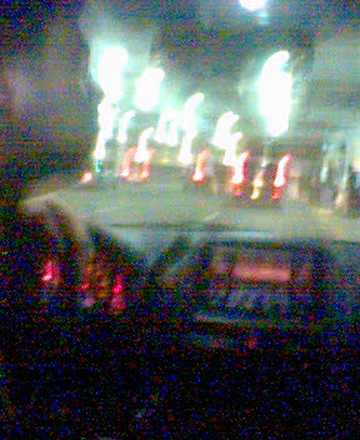The Column: Don’t Blame Yourself
Michael Fallon writes a column on facing down, facing up, and confessing.

“To find a fault is easy; to do better may be difficult.”
— Plutarch
“To err is human. To blame someone else is politics.”
— Hubert H. Humphrey
BLAME IS THE ASSIGNMENT OF RESPONSIBILITY from one entity, very often oneself, to another. Blaming others is a natural and timeless human trait. For instance, blaming is nearly universally observed in children and is thought therefore by many psychologists to be an essential part of human development. One of the first practical things that humans can do once they first gain language skills is, to avoid punishment, to blame others for one’s own misdeeds.
Interestingly, complicated human blaming customs extend back in time at least a couple thousand years (see Plutarch above). An entire genre of “blame poetry” existed in ancient Greece and Rome, like Latin poet Horace’s Epodes. It was full of invective cast at certain stock others.
Consider Epode VII: “To the Roman People”: Whither, whither, impious men, are you rushing? Or why are the swords drawn, that were so lately sheathed? Is there too little of Roman blood spilled upon land and sea?… Does blind phrenzy, or your superior valor, or some crime, hurry you on at this rate? Give answer. They are silent: and wan paleness infects their countenances, and their stricken souls are stupefied…
Such poetry served a useful social purpose (akin to letters to the editor, I suppose) in affirming union among groups by way of dramatizing and mocking behavior, customs, morals, and beliefs perceived as inappropriate or dangerous. We define ourselves in part by casting a derisive eye on people not like ourselves. We blame these inferior others for the things in our lives that we think are less than stellar, thus avoiding taking a hard look at our own role in mucking things up.
IT GOES WITHOUT SAYING THAT ARTS PEOPLE, BEING HUMAN, ARE ALSO consummate blamers. If you ask any artist why it’s so hard to make a living in the arts, you’ll get an earful about the unfairness of the system, about the critics (failed artists) who ignore them, the gallerists (roadblocks) who conspire against them, and the members of the public (blockheads) who don’t support the arts.
I’ve had drunk artists accost and accuse me, and everyone else, of complicity in their failure. I have seen malice in the eyes of artists who can’t stand that anyone else should stand in the way of their making a mark for themselves in the world. I have heard all the blame-ridden complaining that anyone can imagine, and it has come from every sort of arts person—painters, performers, musicians, and mimes, as well as presenters, museum staff, gallery owners, and tech workers. Almost everyone in the arts feels unappreciated, and we all blame someone else for it.
Strangely, I have never once, ever, in my fifteen-plus years of hanging around the artistic water cooler—first as an artist, then as an arts writer—heard anyone in the arts say, “The reason I’m not successful as an artist/musician/gallery owner/street busker is probably because I’m not good enough.” This is strange because, really, when you think about it, this is probably the real reason that most artists fail. Not everyone can be a Picasso or a Warhol, after all. There’s only so much pie to go around; a few in the arts are going to get a slice of pie; the rest are going to go without. And you have to be amazingly savvy to get pie.
All that said, I wasn’t surprised then, some time back, to read Tom Hazelmyer’s great slap-in-the-face open letter to the arts community and everyone else upon the closing of the Ox-Op gallery, formerly located behind Grumpy’s in downtown Minneapolis (click the “Related Content” tab at the foot of the right-hand column for this letter). There was not a word in the rant about the possibility that the gallery was complicit in its own failure. There was no acknowledgment of the gallery staff’s inability to market art to potential customers or to get people truly excited about the art that the author claims is the future of the art world. There was no awareness of the deep conflict involved in attempting to peddle new, edgy, unfriendly art aimed at the tattoo-and-Prince-Albert set that has no money to buy the stuff. Apparently, no one associated with the gallery—even Grumpy’s, which had to pull its subsidy of the space due to budget concerns—was responsible for the gallery’s failure.
It’s the easiest thing in the world to say, I’m failing and it’s your fault. It’s much more difficult to consider maybe I’m failing because I’m not as great as I think I am, because maybe my basic idea isn’t as appealing as I imagine, because maybe what I do is not good enough to attract enough attention from buyers. Because maybe it’s my own fault I can’t hack it in the tough artistic marketplace.
Of course, only a truly cruel person would relish telling the failed or failing artist this kind of thing, so I’ll leave it to Hazelmyer to check his own conscience and make his own conclusions. I’ll only say that it’s predictably bad form to blame, in his letter, smokers, non-smokers, the city council, the “Moral Majority,” and the “old school art crowd” for the failure of the gallery. Further, it was rather classless to write, literally, “FUCK YOU” to everyone who didn’t support Ox-Op’s erstwhile efforts.
Of course, considering how common it is for those who are failing to blame everyone else, we shouldn’t be surprised at Hazelmyer’s very human send-off. We just thought Ox-Op was more fun and lively an experiment than is typical around here, and it’s too bad that it closed on this all-too-typical note.